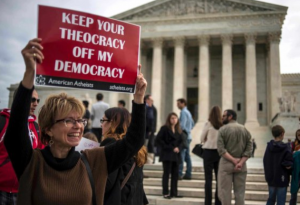
Prayers within a place of worship seem right, but even some clergy think it’s a bad fit when prayers are imposed on others beyond a given faith community.
The Supreme Court’s recent 5 to 4 decision allowing the town of Greece New York to open its meetings with a prayer (Greece v. Galloway, 2014) was a blow to groups like Americans United for Separation of Church and State. Barry Lynn’s organization was among the petitioners arguing that it was a violation of the Establishment Clause of the First Amendment to allow municipal groups to begin meetings with a spoken prayer. The clause states that a governmental body cannot establish or impose religious beliefs on others. Most of the discussion surrounding this judgment has focused on when a religious act in a civic space passes the threshold of being more than simply “ceremonial.”
The idea of officially sanctioned prayers in secular spaces poses a reasonable question. Why is a spoken public prayer necessary at all? Wouldn’t a moment of silence do the same thing, with the benefit of not of leaving some citizens with the impression that they have been excluded? In the United States it is common in many communities for a town or community to invite members of the Christian clergy to perform these functions, even though attendees at meetings often include non-Christians and non-believers. Of the two plaintiffs in Galloway, one was Jewish and the second was an atheist. They objected to the fact that most prayers in the upstate New York community invoked God and Jesus.
The Bible’s Matthew 6:6 advises the devout to enter into a private place for prayer. “When thou prayest, enter into thy closet, and when thou hast shut thy door, pray to thy Father which is in secret. . .” We also know from other Gospels that Jesus often left his followers to pray alone. He seemed to have no appetite for turning prayer into a rhetorical exercise.
If prayer is what most of us assume it to be–a conversation between oneself and God–it by default beyond the notice or sanction of the state. We are truly free to pray almost anywhere at any time. But insisting on public prayers spoken in behalf of a group often seems to represent an ersatz kind of religiosity that uses piety to conceal a less noble rhetorical function. Because they are meant to be seen, spoken prayers demand at least the outward compliance of all who are present. By essentially demanding visible supplication to the speaker’s God there is also an implied request for at least tacit endorsement. Only a bore would interrupt another’s fervent prayer.
There seems to be an additional function of prayers offered in schools, or at the beginning of town meetings in places like Greece New York, or just before opposing teams beat each other up on the playing field. Some of these efforts seem to be back-door attempts at what a sociologist might call “social legitimation.” Those who insist on a ritual of public prayer are also insisting to be noticed. And one reasonable guess is that they are using the specific language of their faith to impose their own aspirational values on the larger community.
As things go, this kind of inducement to compliance is no more than a mild form of coercion. But using the good will of others to achieve a private objective is not a pretty sight, especially when the process is ostensibly democratic. The idea of personal freedom is degraded when we are forced into arbitrary forms of compliance. It’s one thing if a self-selected group wishes to invoke prayers heard by all members. But that is not the case with those who gather to further civic causes. Communities are often diverse. And most civic groups are organized around instrumental rather than inspirational goals. So when authorized by cities and other secular establishments, public prayers seem to function as a kind of theater of status endorsements: rewarding the compliant and reminding those beyond the pale that they are a minority.